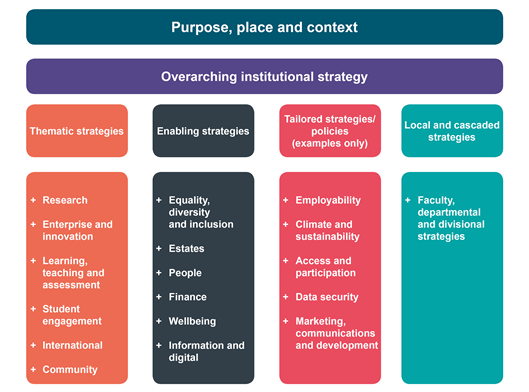Last week, we launched our new initiative: the Advance HE Collaborative Development Fund: New Challenges, New Solutions, building on the growing appetite in the sector to work collaboratively on pressing strategic challenges and significant issues of shared concern. Looking at three specific areas of significant challenge, we’re inviting submissions from our members to lead grant-funded research projects valued at between £20,000 and £35,000 per project.
Here, Doug Parkin, Advance HE’s Principal Adviser for Leadership and Management, introduces one of the three areas of challenge:
The reshaping of Higher Education and Research Institute strategy and culture: pandemic perturbations, evolution or revolution?
At the best of times developing strategy, that challenge of trying in some way to shape the future, is a difficult game to play. Right now, in this pandemic world, the torrent of uncertainties and enforced changes may make strategic planning feel almost impossible. Whilst in some respects the pace of change has seen an acceleration in widespread innovation, particularly in the field of on-line and blended learning, there are many other areas where the long-term impact and ramifications of changes are far from understood.
Working from home, disconnected teams, the emphasis on teaching over research, turbulent student recruitment, the loss of international, new dynamics in the relationships with local partners and communities, high levels of staff stress, issues of isolation and inclusion, new technologies for communication, and significantly reset and recast leadership challenges. All of this will have influenced the framing and reframing of institutional strategies, and alongside this the transformation of culture.
The goal of this strand will be to review the range of radical changes to institutional strategies and strategic thinking brought about so far by the pandemic, and hand-in-hand with this the transformation of organisational cultures. In essence to seek out answers to the core questions, what is transient, what is transformational and what is existential?
This project will be an opportunity to take an early look at how strategy and culture is starting to be re-shaped across the higher education and research institute sector. It will be challenged with identifying themes, questions and concerns, and will disseminate both ‘apparent’ good practice (a longer view is always needed to assess the full/true impact of strategy) and areas of difficulty and contention. Now more so than ever, it can be extremely difficult to pick out the true strategic signals from the background noise of repeated reactive change, but as 2020 transitions into 2021 there is a timely opportunity to start to take soundings across the sector.
One aspect of this study will be to consider the massively accelerated use of online technologies, the pivoting of learning and teaching and student engagement, and the opportunities and challenges presented to institutions as regards the reshaping of strategy. The opportunities may be far reaching, and the challenges take in everything from inclusion to new business models.
An area that will be coming into sharp focus as events move forward is people strategy. It is well known that as working practices change and workplace relationships shift, the culture of an organisation based on an iceberg plinth of tacit assumptions will start to transform. Agile and responsive people strategies and organisational development frameworks will be needed to support the evolution or even revolution of higher education/research institute cultures. Within this there will be significant questions, seen and unseen, as regards equality and inclusion.
Beneath the canopy of institutional strategy, however well defined, there is a multiplicity of thematic, enabling, tailored and cascaded strategies and policies that make up the strategy landscape overall. Another aspect for consideration in this project will be the shifts in focus and emphasis that may have come about with regard to some of the key thematic strategies, for example research and enterprise, and whether there has been in some sense a re-balancing of agendas. This may also apply to enabling strategies, with people strategy and culture having been highlighted above.

Our ambition for this and the other two projects is to see the successful bid teams articulating how they will engage through the work with the diversity of our global membership base spanning higher education, in all its settings, and where appropriate research institutes. Working with us to maximise reach and participation, we wish to see benefit from both the discovery phase and project outputs for the full breadth of our membership.
Applications could be from a single bidding institution leading a project demonstrating broad base, wide reaching engagement through the delivery and creation of outputs, or could potentially take the form of a consortium of institutions with a single institution leading the bid. Regardless of the approach, preference will be given to bidders that demonstrate engagement with the themes with a broad range of our member institutions; encouraging contributions from different types of institutions in different countries.
Using these grant funds in this way we are aiming to help create the space within our member benefit activity to address emerging complex challenges, enabling projects that are collaborative in nature, allowing for both exploratory phases and output components that reflect this and a focus on co-creation of insight and resources.
All of the information required, including detailed guidance for each call and how to apply for funds, is available here.
The deadline for applications in 12 noon GMT on 11 December 2020 with successful bidders being notified on 18 December 2020.
We look forward to working with the successful bid teams on taking forward these exciting initiatives for the benefit of all of our members; generating new insight and successful approaches to these significant, generative and largescale challenges.